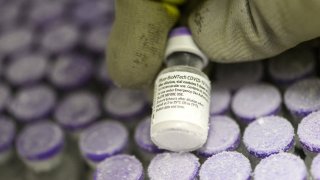
- Pfizer is seeking permission from the FDA to store its Covid-19 vaccine for two weeks at temperatures commonly found in pharmaceutical freezers and refrigerators.
- If the FDA grants Pfizer's request, it could make it easier to distribute the vaccine across the U.S. at a time when the pace of inoculations has been slow.
Pfizer said Friday it is seeking permission from the Food and Drug Administration to store its Covid-19 vaccine for two weeks at temperatures commonly found in pharmaceutical freezers and refrigerators.
The vaccine, which was developed with German drugmaker BioNTech, currently needs to be stored in ultra-cold freezers that keep it between minus 112 and minus 76 degrees Fahrenheit, according to the FDA. Pfizer said it submitted new data to the U.S. agency that shows the vaccine is stable between minus 13 and 5 degrees Fahrenheit.
If the FDA grants the request, it could simplify logistics for distribution of the vaccine. Federal and state officials are trying to pick up the pace of vaccinations across the nation as the virus spreads.
Get South Florida local news, weather forecasts and entertainment stories to your inbox. Sign up for NBC South Florida newsletters.
"We have been continuously performing stability studies to support the production of the vaccine at commercial scale, with the goal of making the vaccine as accessible as possible for healthcare providers and people across the U.S. and around the world," Pfizer CEO Albert Bourla said in a release. "If approved, this new storage option would offer pharmacies and vaccination centers greater flexibility in how they manage their vaccine supply."
Medical experts had warned that Pfizer's vaccine would present logistical challenges because of the need for ultracold temperatures. In December, U.S. officials said they quarantined several thousand doses in California and Alabama after an "anomaly" in the transportation process caused the storage temperature to get too cold.
The vaccine is shipped in a special thermal container that can be used as temporary storage for up to 30 days by refilling with dry ice every five days. Before mixing with a saline diluent, the vaccine may also be refrigerated for up to five days at standard refrigerator temperature, between 36 degrees and 46 degrees Fahrenheit, according to the company.
Money Report
By comparison, Moderna's vaccine needs to be shipped at between minus 13 and 5 degrees Fahrenheit. It has said its vaccine remains stable at 36 to 46 degrees Fahrenheit, the temperature of a standard home or medical refrigerator, for up to 30 days. It can be stored for six months at minus 4 degrees Fahrenheit.
Johnson & Johnson's vaccine, which is expected to be authorized for emergency use by the FDA as early as this month, has said it plans to ship its vaccine at 36 to 46 degrees Fahrenheit.
As additional stability data is obtained, Pfizer said it anticipates the shelf life could be extended, and alternate short-term temperature storage may be considered.






